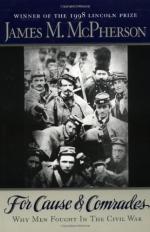
|
| Name: _________________________ | Period: ___________________ |
This quiz consists of 5 multiple choice and 5 short answer questions through Chapter 10, We Know That We are Supported at Home.
Multiple Choice Questions
1. During the discussion of leadership, which of the following Generals had a very different reputation at Gettysburg than he had earlier at Malvern Hill?
(a) General Mercer Tomlinson.
(b) General Lewis Armistead.
(c) General James Thomas.
(d) General Willis Gorman.
2. When a twenty-five year old soldier in the 2nd Vermont married his fiancee during a furlough in "Chapter 10: We Know That We are Supported at Home," how many months was he with her during the first year of marriage?
(a) 10.
(b) 1.
(c) 4.
(d) 7.
3. After discussing how the language of soldiers in letters home is cliche today, McPherson says that which writer noted that World War I made words like "glory" mock-heroic?
(a) John Steinbeck.
(b) Walt Whitman.
(c) Ernest Hemingway.
(d) Henry James.
4. As "Chapter 9: Slavery Must be Cleaned Out" opens, McPherson says a Texas private predicted Confederate victory how long before General Lee surrendered at Appomattox?
(a) 6 months.
(b) 4 weeks.
(c) 1 year.
(d) 2 years.
5. While attempting to define the "glorious institutions" that kept men fighting during the Civil War, a soldier from which state defined it as "the guaranty of the rights of property, liberty of action, freedom of thought, religion...that kind of government that shall assure life liberty & the pursuit of happiness"?
(a) Kentucky.
(b) Ohio.
(c) Michigan.
(d) Virginia.
Short Answer Questions
1. Which of the following states had the strongest convictions about the war, according to the descriptions of Southern motivations for war?
2. After the battle of Fredericksburg, which famous writer visited his brother, a lieutenant in the 51st New York, after the man had been wounded?
3. Which of the following was a major in the 19th Iowa, described in "Chapter 4: If I Flinched I Was Ruined," who would walk and let injured men ride his horse?
4. When a Quaker captain in the 5th New Jersey was threatened to be turned out of his faith if he did not resign, he found he could not leave and was later killed in which battle?
5. In the discussion of religious fatalism, what is described as the most dangerous position in the infantry?
|
This section contains 358 words (approx. 2 pages at 300 words per page) |

|




